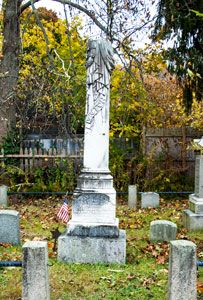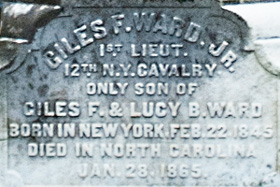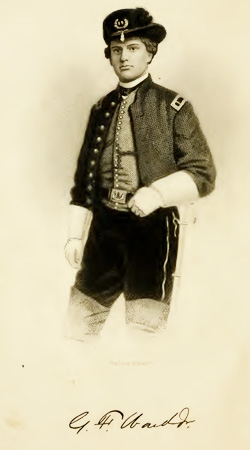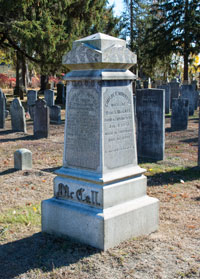Lieutenant Giles F. Ward, Junior
[From "A Memorial of Giles F. Ward, Jr., Late First Lieut. Twelfth NY Cavalary",
by William Ives Buddington, D.D., Pastor of Clinton Avenue Congregational Church, Brooklyn, NY]

Along the eastern boundary of Cypress Cemetery located approximately halfway between College Street and South Cove, stands a tall tombstone, carved with a draped cloth and inscribed "Victor" (photo, left). It is the tombstone of Lieutenant Giles F. Ward, Jr., who died before his twentieth birthday in New Bern, North Carolina during the Civil War. Along with World War 1 Waggoner Harry Faulk, also buried in Cypress, Giles is one of the few soldiers in Cypress that actually died during wartime. His story is told in a memorial document written by William Ives Buddington, D.D., a pastor at the family Congregational Church located in Brooklyn, NY. "A Memorial of Giles F. Ward, Jr., Late First Lieut. Twelfth NY Cavalry", published by Anson D. F. Randolph of New York in 1866, is the source for this story. The following excerpts from letters and rememberances from Pastor Buddington paint a picture of an unusual young man that won the admiration of everyone who knew him.
Pastor Buddington opens with the following memorial referring to the end of the Civil War:
Now that the strange sad history of sacrifice and blood is ended, our nationality preserved, and we at peace; our first and most sacred duty is to gather up memorials of the heroic dead, and perpetuate the memory of their virtues. Every community throughout the loyal States - I had almost said every household - has been represented in this noble army of martyrs. This Church has precious names to present to a redeemed and grateful country; names that posterity, heir to the future their blood has made, will not suffer to die.
Of one of these I propose to speak, constrained not less by a sense of duty to the living than to the dead; of Giles F. Ward, Jr., one of the youngest and most heroic in the volunteer army of the United States. He was born on the twenty second of February, 1845, and died before his twentieth birthday, on the twenty eighth of January, 1865, having served his country as First Lieutenant in the Ninety Second regiment, New York State Volunteers; next as Adjutant of the regiment; and then as Aid-de-Camp upon the staff of General Palmer ; and finally as First Lieutenant in the Twelfth New York Cavalry.

Giles grew up in New York, but had a childhood home in Old Saybrook. Described with adjectives such as " affectionateness, purity, and nobleness", he was placed in a military academy in Sing Sing, NY at the age of nine. He was home-sick, but wrote in letters that "...there is no good in being home-sick; it only makes me feel bad and I am going to try and be a good boy, and Christian, and my prayers are more earnest in asking God to make me a Christian. Do pray for me, too, dear father, and ask God frequently and earnestly to make me a Christian. I know, father, you will do it without my asking you. O God! will you answer his prayers?" As a boy, Buddington described him as having a character "...distinguished for its proportionateness and early maturity".
His intention was to attend West Point, but when he had gone to Washington to obtain cadetship, he found four hundred names before his on the list, so he gave that up. Instead, when he became seventeen, he gained his parent's consent and, after "disappointments and delays", he obtained his commission and joined the Army of the Potomac. In one of his many letters sent home he writes "... I tell you, the people of the North little understand the hardships and sufferings of their defenders; the sleepless nights on picket; the blistered feet on the march; the wet clothes and hungry stomachs of our brave soldiers!"

In testimonials and memorials from his "companions in arms", it was said that "no truer soldier ever faced the missiles of death", and that "no young officer in the army had won a prouder position than he in the confidence and admiration of his commanders." He was clearly a soldier who would be able to go very far in the Army, were it not for the meeting of his untimely death. One of his commanders, a Colonel Savage, indicated that his "intimacy with Mr. Ward gradually increased, until he was a frequent and welcome visitor in my camp,and I never rode in New Bern without calling at his quarters." When Giles Ward, Sr. visited his son in North Carolina just before his son's death, he witnessed that "upon his shoulders of less than twenty years, a weight of responsibility to which the broad shoulders of a ripened manhood would scarcely seem sufficient" was clearly evident.
Pastor Buddington wrote:
"....Our young friend did not receive his death-wound from the enemies of his country. It pleased God to order it otherwise. On an expedition, in an unsuspecting moment, when danger and death were not thought of, by the careless handling of a fire-arm in his own hand and that of a friend, the fatal bullet entered his body, and he fell in death, almost as soon as he was aware that he was hurt."
From Colonel Frankle to Brigadier-General I. N. Palmer, January 29, 1865:
It becomes my painful duty to inform you of the death of Lieutenant G. F. Ward, Twelfth New-York Cavalry. His troop, under command of Captain Horn, of the same regiment, had halted at the house of Mr. Stevenson, six miles from Coleraine, previous to engaging the enemy, a few miles distant. While there, the sad accident occurred.
Lieutenant Ward was almost instantly killed by the accidental charge of a pistol in the hands of Captain Horn. The ball must have passed through his heart, as he did not speak afterward. I was not present at the time, but arrived a short time afterward, learning the facts from Lieutenant Turner, who was present, and who will give you further particulars.
I will not attempt to express my feelings in view of this melancholy event. He was brave and generous, beloved by his fellow officers. Just in the bloom of manhood, he was developing a character which would have made him an illustrious ornament to his profession, as well as the social circle in which he moved. His moral courage added grace to his valor as a soldier; and when we think of all his noble qualities, we wonder why death should mark him so soon. But I can scarcely imagine the painful feelings that will move you, sir, on receiving this sad intelligence. You have known him longer and better than I, and the relations between you and our lamented friend, I am aware, were of no common kind. I can not do more than tender the deepest sympathy for yourself and his many friends in this department, as well as for his afflicted relatives at home.
My deep grief must be my only apology for addressing a superior in this unofficial way. I will add, that Captain Horn is suffering the most severe mental torture, and deserves the heartiest sympathy and consolation from all his friends.
A fellow - officer, in a letter to his friends in an adjoining State, describes in a few words the funeral scene at New-Bern:
"I had the sad pleasure of attending to every little particular connected with the funeral, from the time the body arrived here, till we laid it gently down aboard the steamer. I never witnessed a more impressive scene than that procession. An escort of his own company; a band playing a solemn dirge; the hearse containing the mortal part of my dear, dear Ward ; his favorite horse, led by his servant; and from fifty to sixty officers following each other, each one a sincere mourner."
An extract from a May, 1865 letter from a Major Benjamin offered the following:
Giles was a boy not to be forgotten. That winning and peculiar smile that seldom left his countenance; that cheerful and generous disposition; and that honest, manly deportment, must always claim our admiration, and long retain a place among our pleasant memories.
Gile's Final Farewell in Old Saybrook
Besides the military funeral at New Bern, a service was held in the Clinton Avenue Congregational Church, Brooklyn, where the family resided; and on the following day, the last public honors to his remains were paid in the Congregational Church of Saybrook, Connecticut. An eye-witness describes the last scene in Saybrook as follows:
"At the entrance of the church, flags were heavily draped with black, and throughout the town were at half-mast - mute testimonials to the general sadness. The young officers who had borne him from New-Bern festooned the flag above him with camellias, and with fraternal love assisted in the last arrangements.
The orderly who had served the young Lieutenant through many months of army life, and who had kept faithful vigils day and night during that sad week, still clung to the lifeless form. At twelve o'clock the church was filled with sympathizing friends, who crowded in to take the last look at one so tenderly loved. A profusion of the rarest flowers encircled his head and breast; and so life-like were his beautiful features in their deep sleep, that those who had known and loved him in childhood, watching his bright career with admiring pride, now lingered by the "tenement of clay" with a clinging fondness which told how deep was their sorrow.
At one o'clock the services commenced with the reading of the Scriptures by the pastor. Rev. S. McCall, followed by appropriate remarks of fervent sympathy.
[It was Reverend McCall, also buried in Cypress, who presided over the funeral ceremony for the reinterment of Lady Fenwick in Cypress five years later.]
Finally, Pastor Buddington wrote:
Amid tears and sobs, the last fond look was taken, and the mournful procession bore him to his last resting place - on, past the home of his boyhood, where his coming had ever been the harbinger of joy and gladness - but where the drooping flag now told of sorrow; on to the ancient cemetery ground consecrated by the honored dead, the forefathers of the colony and the resting place of his paternal ancestry. There the youthful hero was laid gently down; tender and solemn words were spoken; a young army friend scattered sweet violets upon the lifeless form and it was lowered to its final rest - 'till the trumpet shall sound.'"
Read the entire memorial, entitled A Memorial of Giles F. Ward, Jr., Late First Lieut. Twelfth NY Cavalry to more fully understand Giles F. Ward, Jr., the man he was - even at such a tender age - and the respect he had from his companions in arms and the commanders that led him.





